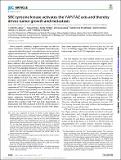| dc.contributor.author | Lamar, John | |
| dc.contributor.author | Xiao, Yuxuan | |
| dc.contributor.author | Norton, Emily | |
| dc.contributor.author | Jiang, Zhigang | |
| dc.contributor.author | Gerhard, Genevieve M. | |
| dc.contributor.author | Kooner, Simrin | |
| dc.contributor.author | Warren, Janine S. A. | |
| dc.contributor.author | Hynes, Richard O | |
| dc.date.accessioned | 2020-07-07T18:05:12Z | |
| dc.date.available | 2020-07-07T18:05:12Z | |
| dc.date.issued | 2018-12 | |
| dc.date.submitted | 2018-06 | |
| dc.identifier.issn | 0021-9258 | |
| dc.identifier.issn | 1083-351X | |
| dc.identifier.uri | https://hdl.handle.net/1721.1/126071 | |
| dc.description.abstract | When properly employed, targeted therapies are effective cancer treatments. However, the development of such therapies requires the identification of targetable drivers of cancer development and metastasis. The expression and nuclear localization of the transcriptional coactivators Yes-associated protein (YAP) and transcriptional co-activator with PDZ-binding motif (TAZ) are increased in many human cancers, and experimental evidence indicates that aberrant YAP or TAZ activation drives tumor formation and metastasis. Although these findings make YAP and TAZ appealing therapeutic targets, both have important functions in adult tissues, so directly targeting them could cause adverse effects. The identification of pathways active in cancer cells and required for YAP/TAZ activity could provide a way to inhibit YAP and TAZ. Here, we show that SRC proto-oncogene, nonreceptor tyrosine kinase (SRC) is an important driver of YAP/TAZ activity in human breast cancer and melanoma cells. SRC activation increased YAP/TAZ activity and the expression of YAP/TAZ-regulated genes. In contrast, SRC inhibition or knockdown repressed both YAP/TAZ activity and the expression of YAP/TAZ-regulated genes. We also show that SRC increases the activity of YAP and TAZ by repressing large tumor suppressor homolog (LATS), and we identify the GTPase-activating protein GIT ArfGAP 1 (GIT1) as an SRC effector that regulates both YAP and TAZ. Importantly, we demonstrate that SRC-mediated YAP/TAZ activity promotes tumor growth and enhances metastasis and that SRC-dependent tumor progression depends, at least in part, on YAP and TAZ. Our findings suggest that therapies targeting SRC could help manage some YAP/TAZ-dependent cancers. | en_US |
| dc.description.sponsorship | National Institutes of Health (Grant P30CA014051) | en_US |
| dc.language.iso | en | |
| dc.publisher | American Society for Biochemistry & Molecular Biology (ASBMB) | en_US |
| dc.relation.isversionof | http://dx.doi.org/10.1074/jbc.ra118.004364 | en_US |
| dc.rights | Creative Commons Attribution 4.0 International license | en_US |
| dc.rights.uri | https://creativecommons.org/licenses/by/4.0/ | en_US |
| dc.source | Journal of Biological Chemistry | en_US |
| dc.title | SRC tyrosine kinase activates the YAP/TAZ axis and thereby drives tumor growth and metastasis | en_US |
| dc.type | Article | en_US |
| dc.identifier.citation | Lamar, John M. et al. "SRC tyrosine kinase activates the YAP/TAZ axis and thereby drives tumor growth and metastasis." Journal of Biological Chemistry 294, 7 (December 2018): 2302-2317 © 2019 Lamar et al. | en_US |
| dc.contributor.department | Massachusetts Institute of Technology. Department of Biology | en_US |
| dc.contributor.department | Koch Institute for Integrative Cancer Research at MIT | en_US |
| dc.relation.journal | Journal of Biological Chemistry | en_US |
| dc.eprint.version | Final published version | en_US |
| dc.type.uri | http://purl.org/eprint/type/JournalArticle | en_US |
| eprint.status | http://purl.org/eprint/status/PeerReviewed | en_US |
| dc.date.updated | 2019-12-09T18:11:03Z | |
| dspace.date.submission | 2019-12-09T18:11:15Z | |
| mit.journal.volume | 294 | en_US |
| mit.journal.issue | 7 | en_US |
| mit.metadata.status | Complete | |
